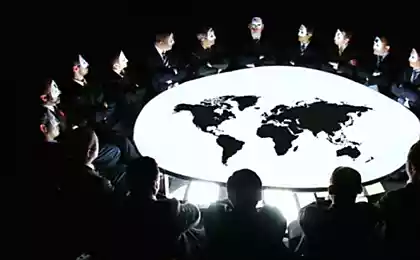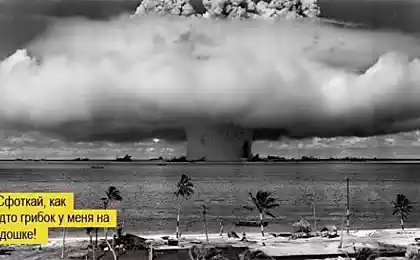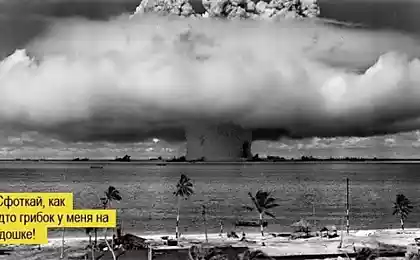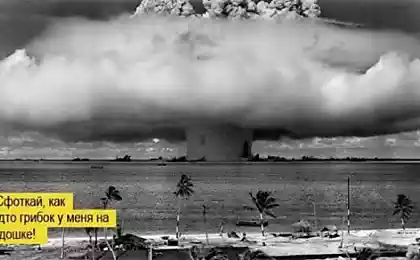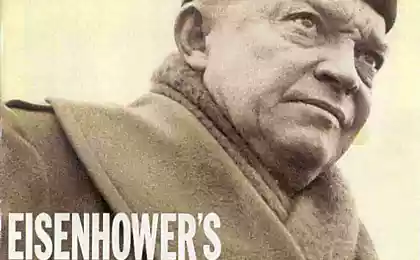1161
The effects of US foreign policy for 30 years
I suggest you read further about how the US sticks its nose into politics of other countries, has nearly 30 years posing as the world's policeman.
Grenada, 1983. Unilateral intervention by the United States.
After the military coup that took place in Grenada in 1979, to power in the country came to left-radical movement New JEWEL Movement. In October 1983, under the pretext of protecting a few hundred are in the country for medical students from the United States, as well as at the request of a number of countries of the Organization of American States - Antigua and Barbuda, Saint Lucia, and Saint Vincent and the Grenadines, Dominica - US President Ronald Reagan ordered the start of the military operation, codenamed "Flash fury».
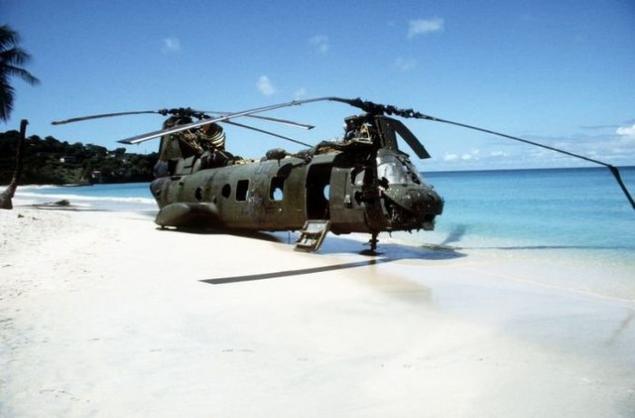
US army quickly enough managed to suppress the weak, ill-equipped armed forces in Grenada, which did not exceed 1,000. It was one of the few cases when the United States did not support even allies. He spoke against the military operation the United Kingdom, France, Sweden, the countries of the socialist bloc and Latin America. This invasion of Grenada was the first in the history of US military action abroad since the Vietnam War. Although some local failure, the operation was successful. This military operation has played a role in restoring the lost prestige of the US Army. Lessons learned from it were used in the preparation of a much larger invasion of Panama. Moreover, for most of Grenada, with the exception of the change of regime, the operation of any special effects had. United States even gave the island 110 million. Dollars of compensation for the damage that was caused during the operation.
Panama, 1989. Unilateral intervention by the United States.
In the mid-1980s, relations between Panama and the United States began to deteriorate. The reason for the looming conflict were the conditions of the transfer of control over the Panama Canal, of strategic importance. At a time when the Government of Panama launched a foreign policy that was independent of the US, and it was to strengthen ties with the countries of South and Central America, from Washington has begun serious economic, diplomatic and informational pressure. During the introduction of economic sanctions against Panama followed the US prepared a coup attempt, which ended unsuccessfully. As a result, in December 1989, US President George HW Bush ordered the start of the military operation "Just Cause».
The operation resulted in a change in the pro-American government of Panama. The new president Guillermo Endara Galimani almost immediately began the process of the struggle with the memory of the former president of the country Torihose who advocated the nationalization of the Panama Canal. US military operations in Panama became the first American intervention in history when as a theoretical justification of the operation, Washington used the slogans of "save and restore democracy."
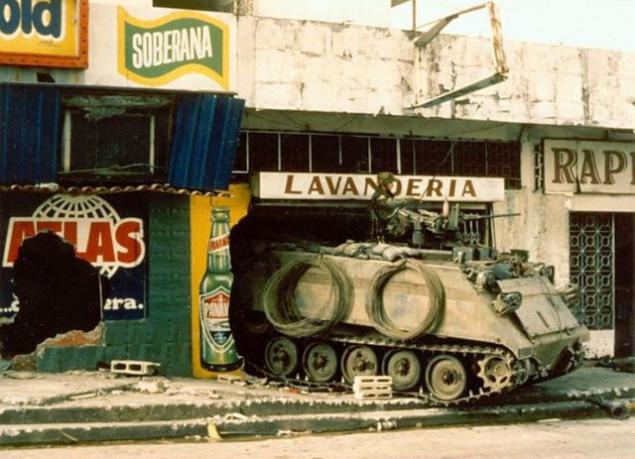
In the course of military operations in Panama, the US military inflicted air and artillery strikes on urban areas. The destruction inflicted on many civilian infrastructure, residential buildings. The total damage that was caused the economy of Panama, amounted to about 1 billion. Dollars. Another of the consequences of the US invasion was the deterioration of the living conditions of the population. In a statement, the International Committee of the Red Cross was marked deficiency of medicines, essential goods, which has led to several deaths and the disruption of public utilities of the country was the cause of the epidemic. Also during the fighting stopped traffic on the Panama Canal, which in turn caused damage to the state's economy, which could not have been drawn into the conflict.
Libya, 1986. The military operation "Eldorado Canyon».
The military operation under the code name "Eldorado Canyon" was carried out against Libya in April 1986. The operation included transient bombing of an important military and administrative facilities of the country. The blow was made with the use of tactical aircraft. All planned to destroy the objects were amazed. On the ground, destroyed 17 Libyan fighter jets and 10 military-transport aircraft IL-76. The reason for the operation was charged Libya of supporting international terrorism. In particular Tripoli was accused of organizing a series of terrorist attacks against US citizens in Europe (the explosion aboard the aircraft flight Rome-Athens April 2, 1986, an explosion at the La Belle discotheque in West Berlin, which was visited by American soldiers).
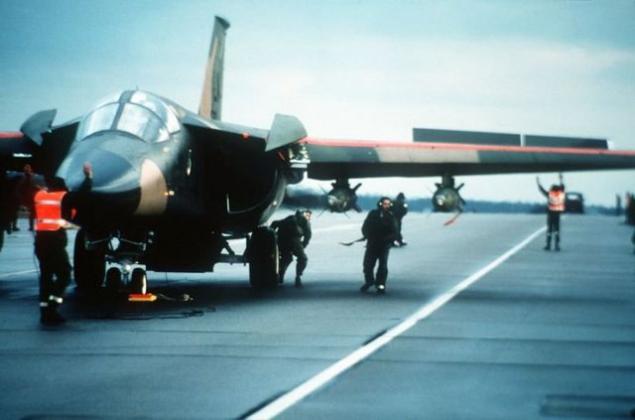
Most of all, Libya was not involved to any major terrorist attacks until 1988, when the sky over Lockerbie in Scotland blow up the plane of Pan Am. This terrorist act killed 259 passengers and crew members as well as 11 people who were killed on the ground. In 2003, Libya acknowledged responsibility of its officials for the explosion aboard flight 103 Pan Am.
Iraq, 1991. The military operation of the Multinational Force (MNF) to the UN sanctions.
The reason for the military conflict in Iraq was an attack on Kuwait. In July 1990, Baghdad, Kuwait announced that it is an economic war against Iraq with the help of underpricing of oil on the world market, as well as in the illegal production of oil on the Iraqi border areas with large Rumaila field. As a result, in August 1990 the Iraqi army invaded Kuwait and occupied the country easily. Baghdad announced the annexation of the country, which became the 19th province within Iraq and called Al-Saddam. In response to Saddam Hussein's regime had imposed sanctions. Extra Security Council was convened UNPO, which condemned the actions of Iraq and made a proposal to organize an international coalition led by the United States. It was announced the beginning of the operation code-named "Desert Shield", which included the concentration of the coalition forces in the region. In January 1991, the MNF launched Operation "Desert Storm" and "Desert Saber" (to liberate Kuwait).
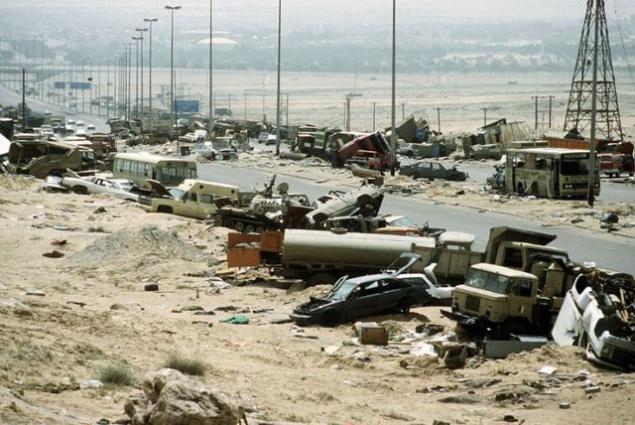
The bombing of Iraq by the international coalition, which formed the backbone of the US military, began in January 1991, in February, the operation of ground forces, which ended in a crushing defeat of the Iraqi army. By April of 1991 the fighting had ceased. In total, the conflict had to take part 665, 5 thousand troops from the US. The American army has lost 383 killed and 467 wounded, the loss of Iraq amounted to 40 thousand people were killed and about 100 thousand wounded. After the long air offensive coalition troops a few days of the defeated Iraqi, was won by a crushing victory. All UN Security Council resolutions on the conflict failed, Kuwait was liberated.
Somalia, 1993. The intervention by the US and some other countries with UN sanctions.
Operation in Somalia is one of the inglorious pages of the history of the United States, along with the military conflict in Vietnam. Many ordinary people she knows in the film "Black Hawk Down." In the early 1980s, the Somali civil war broke out, the Somali opposition began fighting against the legitimate government of the country. By the early 1990s, the country was in the midst of a large-scale civil war, Somalia was on the verge of a humanitarian catastrophe. Experts estimate the famine in Somalia in the early 1990s caused the deaths of nearly 300 thousand inhabitants. In December 1992, the country had entered the UN peacekeeping force that operated under the operation called "Return Hope". In reality, the operation began with the landing of the capital - Mogadishu - US Marines. In 1993 he launched "Operation Continue Hope." The purpose of this operation was to capture one of the leaders of the local armed group that claimed power in the country, Mohamed Farrah Aidid.
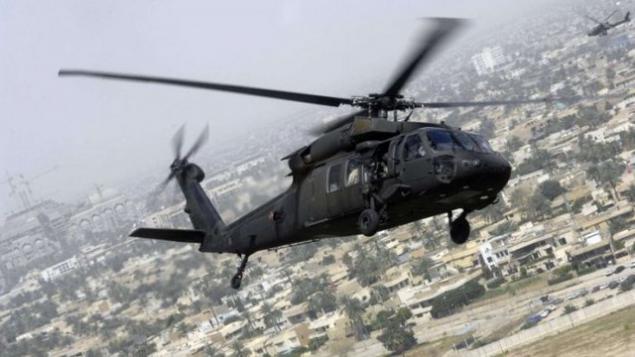
But catch it failed, and the attempt to arrest his supporters ended urban battle in Mogadishu. The fighting lasted from 3 to 4 October 1993 and resulted in unnecessarily large losses Forces peacekeepers. The Americans lost 18 men killed and 84 wounded, one person was captured, the rebels managed to shoot down two helicopters and destroyed several cars. The operation was a complete failure and was the reason why the United States decided to withdraw its troops from the country. The conflict in Somalia has not yet been resolved.
Yugoslavia, 1995. NATO's military operation without UN sanction.
The first large-scale military operation in the history of NATO was held in violation of the principles of international law. The UN Security Council did not accept the resolution that authorized the use of military force by NATO countries. As part of the ensuing 1992 Bosnian war, Washington and its NATO allies have taken openly anti-Serbian stance, acting with the support of Bosnian Muslims. In 1995, NATO launched an operation "to think about power," which was accompanied by air strikes on Bosnian Serb positions. In this operation, the first time since World War II fighter planes took part in the German Air Force. The operation resulted in the military potential of the Bosnian Serbs has been significantly undermined, prompting their leaders to agree on the path of peaceful negotiations.
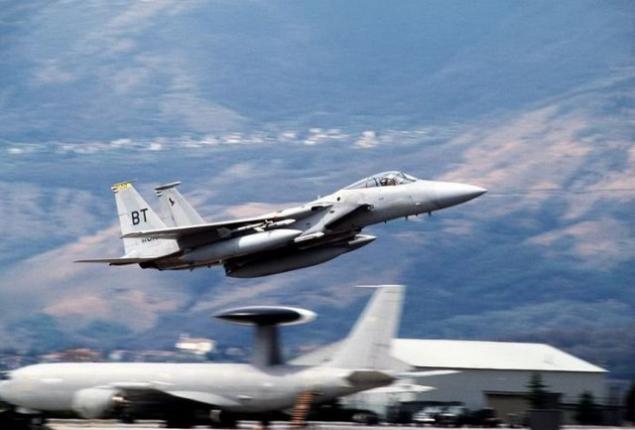
Afghanistan and Sudan in 1998. A unilateral US military strike.
In 1998, the US embassies in Kenya and Tanzania were carried out large-scale attacks. According to US intelligence, blow was previously little-known terrorist group "Al Qaeda." In response to these attacks, US President Bill Clinton said air strikes using cruise missiles in the camps, "al-Qaeda" in Afghanistan and a pharmaceutical factory in Sudan. At the factory, according to the American authorities, chemical weapons were manufactured. Missile strikes were carried out in the framework of "Operation Infinite Reach." It is worth noting that the factory is the largest producer of drugs in the Sudan.
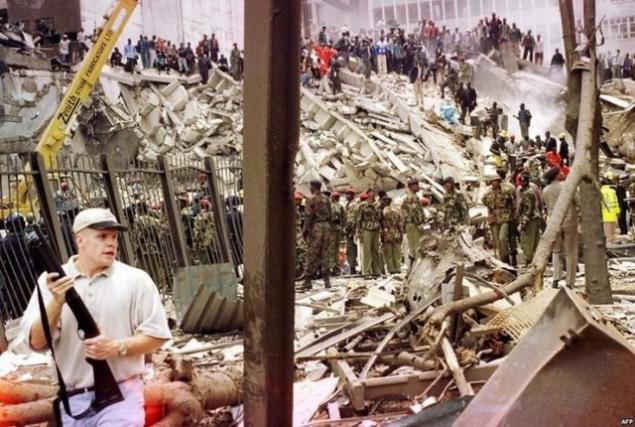
Currently, historians and analysts say that the operation has been hailed bin Laden, who joked that as a result of aviudarov killed a chicken and camels, as the failure of the US to engage in open confrontation with its forces. With only provoked terrorist activity. In October 2000, a suicide bomber group "Al Qaeda" blew up the US destroyer USS Cole in the moment when it refueled in the port of Aden in Yemen. The explosion killed 77 US military. A year later, the September 11 attacks in New York and Washington have killed nearly 3 million civilians.
Yugoslavia, 1999. The NATO intervention without the sanction of the UN.
The reason for the start of military intervention by the US and NATO was the Kosovo war, which began in 1996. Under the pretext of the commission in the province of crimes against humanity and ethnic cleansing, as well as non-fulfillment of requirements for the withdrawal of Serbian troops from parts of the Serbian Autonomous Region of Kosovo and Metohija in March 1999 it launched a military operation "Allied Force". The United States took part in the campaign "Operation Noble Anvil". As air strikes on Bosnian Serb positions in 1995, this operation was positioned by Washington as "humanitarian intervention". As part of this "humanitarian intervention" NATO aircraft for almost 2, 5 months, it struck not only by the objects of military infrastructure, but also in the Serbian town, civilian facilities, bridges and industrial plants. Rocket attacks and air strikes subjected to Belgrade and other major cities of the country.
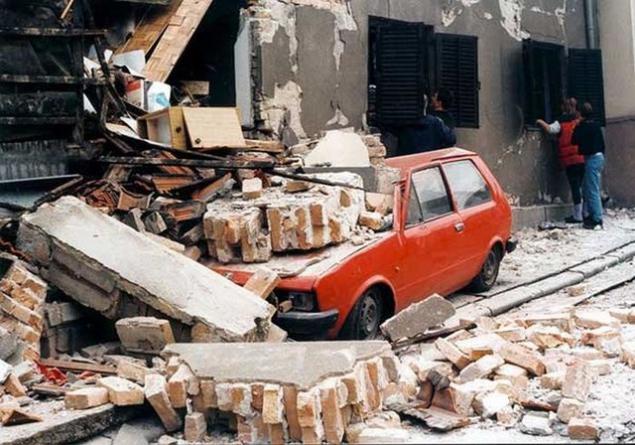
A series of air strikes led to the final collapse of Yugoslavia. The total damage from the attacks was estimated at 1 billion. Dollars. The country's economy has suffered enormous damage. A total of objects of industrial and social infrastructure of the attack was carried out in 1991. As a result of the bombing were completely destroyed or damaged 89 factories, 14 airports, 120 power facilities, 128 objects of industry services, 48 hospitals and clinics, 82 bridges, 118 for TV-repeaters 61 a tunnel and the road junction, 35 churches and 29 monasteries, 18 kindergartens, 70 schools, 9 faculties of the university buildings, four dormitories. About 500 thousand inhabitants of the country were left without work. Civilian casualties amounted to at least 500 people, including 88 children (not counting the wounded).
Kosovo during the operation almost gained independence. Currently, the State recognized 103 countries out of 193 UN member states (53, 4%). At the same time, two permanent members of the UN Security Council (Russia and China), as well as more than 1/3 of the countries of the United Nations refused to recognize Kosovo's independence, for this reason the country can not take its place in the UN.
Afghanistan, 2001 - today. The NATO intervention without the sanction of the UN.
After the horrific attacks of September 11, 2001, President George W. Bush demanded that the Afghan movement "Taliban" issuing terrorist Osama bin Laden. At the same time, the Taliban said the US authorities again refused, as in 1998, after the terrorist attacks in Kenya and Tanzania. After that, the US government initiated a military operation "Infinite Justice", which fairly quickly was renamed "Enduring Freedom." In October 2001, we began bombing and rocket attack on the positions of the Taliban forces. The sanctions by the UN Security Council to impose military contingent in Afghanistan - International Security Assistance Force - have been taken after the actual start of the operation. This armed conflict is the longest in US history. Currently, the US ground forces in the process of leaving the country.
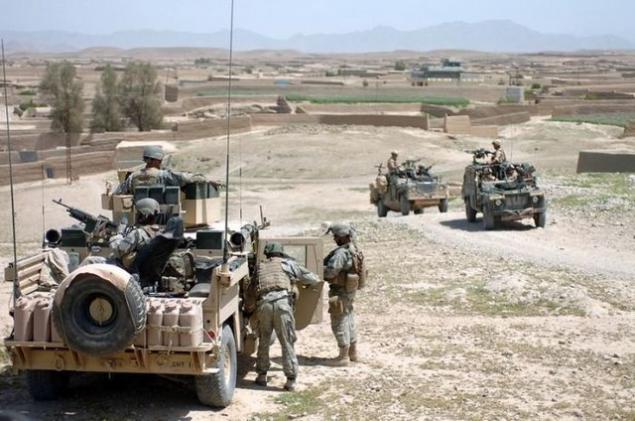
The operation can not be called successful, as unify Afghanistan, and bring him back to civilian life completely failed. During the operation about 500 thousand inhabitants became refugees, from 14 to 34 thousand people were killed. At the same time victims of the conflict are not only the people of Afghanistan but also neighboring countries. Americans are actively using its drones for strikes against terrorists in Pakistan, in some cases, these air strikes killed civilians. Also with the fall of the Taliban in the country has increased significantly the production of drugs - opium.
Iraq, 2003, US intervention and a number of allies without issuing sanctions by the UN.
Washington using fabricated evidence and false intelligence tried to convince the countries of the world that Iraq is actively developing weapons of mass destruction and has chemical weapons. However, the vote on the draft of the resolution proposed by the United States, did not take place. Representatives of Russia, France and China have made clear that veto any draft resolution that would contain an ultimatum with the possibility of the use of force against Iraq. Despite this, the United States and its allies in March 2003 launched "Operation Iraqi Freedom". In May of the same year, US President George W. Bush declared the end of the active phase of hostilities. As in 1991, the Iraqi army was defeated quickly enough, Saddam Hussein's regime fell, and he was later executed.
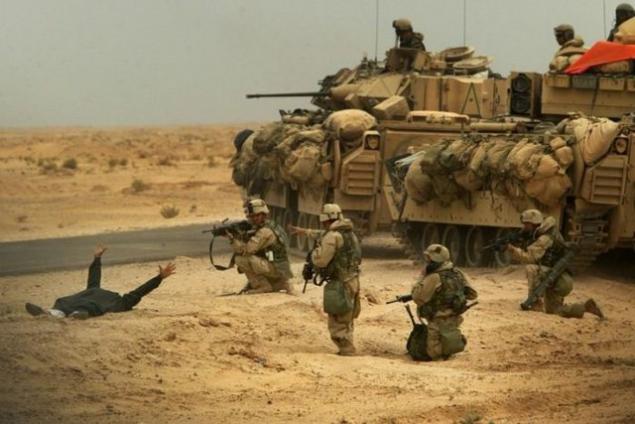
The official date of completion of the Iraq war is considered to be 2011, when from the country were withdrawn last US military. The military campaign in Iraq has cost the United States 4423 dead and 31,935 wounded, civilian casualties in Iraq is difficult to estimate, but only the number of those killed has exceeded 100 thousand people. After the overthrow of Saddam Hussein's regime to a wave of terror. Major terrorist attacks taking place in Iraq today. It is worth noting that the US is not just overthrew Saddam Hussein's regime, but also invested heavily in the reconstruction of the country. By 2010, the volume of US investments in the construction of social and industrial infrastructure of Iraq was 44, 6 billion. Dollars.
Libya, 2011. The NATO intervention authorized by the UN Security Council.
In February 2011, Libya began riots, which escalated into a full-scale armed conflict between opposition groups and government forces led by Muammar Gaddafi. Based on the well proven not use aircraft to suppress peaceful protests in the end of February 2011 the UN Security Council adopted a resolution which imposed sanctions against the official Tripoli. In March 2011, it was adopted another resolution, which established over the territory of Libya unmanned zone. After the adoption of the resolution Aviation NATO launched a bombing positions of government troops and military facilities. Officially, the civil war in Libya ended with the killing in October 2011 of Muammar Gaddafi. However, armed clashes between paramilitary groups and various militias continue to this day.
From
Grenada, 1983. Unilateral intervention by the United States.
After the military coup that took place in Grenada in 1979, to power in the country came to left-radical movement New JEWEL Movement. In October 1983, under the pretext of protecting a few hundred are in the country for medical students from the United States, as well as at the request of a number of countries of the Organization of American States - Antigua and Barbuda, Saint Lucia, and Saint Vincent and the Grenadines, Dominica - US President Ronald Reagan ordered the start of the military operation, codenamed "Flash fury».

US army quickly enough managed to suppress the weak, ill-equipped armed forces in Grenada, which did not exceed 1,000. It was one of the few cases when the United States did not support even allies. He spoke against the military operation the United Kingdom, France, Sweden, the countries of the socialist bloc and Latin America. This invasion of Grenada was the first in the history of US military action abroad since the Vietnam War. Although some local failure, the operation was successful. This military operation has played a role in restoring the lost prestige of the US Army. Lessons learned from it were used in the preparation of a much larger invasion of Panama. Moreover, for most of Grenada, with the exception of the change of regime, the operation of any special effects had. United States even gave the island 110 million. Dollars of compensation for the damage that was caused during the operation.
Panama, 1989. Unilateral intervention by the United States.
In the mid-1980s, relations between Panama and the United States began to deteriorate. The reason for the looming conflict were the conditions of the transfer of control over the Panama Canal, of strategic importance. At a time when the Government of Panama launched a foreign policy that was independent of the US, and it was to strengthen ties with the countries of South and Central America, from Washington has begun serious economic, diplomatic and informational pressure. During the introduction of economic sanctions against Panama followed the US prepared a coup attempt, which ended unsuccessfully. As a result, in December 1989, US President George HW Bush ordered the start of the military operation "Just Cause».
The operation resulted in a change in the pro-American government of Panama. The new president Guillermo Endara Galimani almost immediately began the process of the struggle with the memory of the former president of the country Torihose who advocated the nationalization of the Panama Canal. US military operations in Panama became the first American intervention in history when as a theoretical justification of the operation, Washington used the slogans of "save and restore democracy."

In the course of military operations in Panama, the US military inflicted air and artillery strikes on urban areas. The destruction inflicted on many civilian infrastructure, residential buildings. The total damage that was caused the economy of Panama, amounted to about 1 billion. Dollars. Another of the consequences of the US invasion was the deterioration of the living conditions of the population. In a statement, the International Committee of the Red Cross was marked deficiency of medicines, essential goods, which has led to several deaths and the disruption of public utilities of the country was the cause of the epidemic. Also during the fighting stopped traffic on the Panama Canal, which in turn caused damage to the state's economy, which could not have been drawn into the conflict.
Libya, 1986. The military operation "Eldorado Canyon».
The military operation under the code name "Eldorado Canyon" was carried out against Libya in April 1986. The operation included transient bombing of an important military and administrative facilities of the country. The blow was made with the use of tactical aircraft. All planned to destroy the objects were amazed. On the ground, destroyed 17 Libyan fighter jets and 10 military-transport aircraft IL-76. The reason for the operation was charged Libya of supporting international terrorism. In particular Tripoli was accused of organizing a series of terrorist attacks against US citizens in Europe (the explosion aboard the aircraft flight Rome-Athens April 2, 1986, an explosion at the La Belle discotheque in West Berlin, which was visited by American soldiers).

Most of all, Libya was not involved to any major terrorist attacks until 1988, when the sky over Lockerbie in Scotland blow up the plane of Pan Am. This terrorist act killed 259 passengers and crew members as well as 11 people who were killed on the ground. In 2003, Libya acknowledged responsibility of its officials for the explosion aboard flight 103 Pan Am.
Iraq, 1991. The military operation of the Multinational Force (MNF) to the UN sanctions.
The reason for the military conflict in Iraq was an attack on Kuwait. In July 1990, Baghdad, Kuwait announced that it is an economic war against Iraq with the help of underpricing of oil on the world market, as well as in the illegal production of oil on the Iraqi border areas with large Rumaila field. As a result, in August 1990 the Iraqi army invaded Kuwait and occupied the country easily. Baghdad announced the annexation of the country, which became the 19th province within Iraq and called Al-Saddam. In response to Saddam Hussein's regime had imposed sanctions. Extra Security Council was convened UNPO, which condemned the actions of Iraq and made a proposal to organize an international coalition led by the United States. It was announced the beginning of the operation code-named "Desert Shield", which included the concentration of the coalition forces in the region. In January 1991, the MNF launched Operation "Desert Storm" and "Desert Saber" (to liberate Kuwait).

The bombing of Iraq by the international coalition, which formed the backbone of the US military, began in January 1991, in February, the operation of ground forces, which ended in a crushing defeat of the Iraqi army. By April of 1991 the fighting had ceased. In total, the conflict had to take part 665, 5 thousand troops from the US. The American army has lost 383 killed and 467 wounded, the loss of Iraq amounted to 40 thousand people were killed and about 100 thousand wounded. After the long air offensive coalition troops a few days of the defeated Iraqi, was won by a crushing victory. All UN Security Council resolutions on the conflict failed, Kuwait was liberated.
Somalia, 1993. The intervention by the US and some other countries with UN sanctions.
Operation in Somalia is one of the inglorious pages of the history of the United States, along with the military conflict in Vietnam. Many ordinary people she knows in the film "Black Hawk Down." In the early 1980s, the Somali civil war broke out, the Somali opposition began fighting against the legitimate government of the country. By the early 1990s, the country was in the midst of a large-scale civil war, Somalia was on the verge of a humanitarian catastrophe. Experts estimate the famine in Somalia in the early 1990s caused the deaths of nearly 300 thousand inhabitants. In December 1992, the country had entered the UN peacekeeping force that operated under the operation called "Return Hope". In reality, the operation began with the landing of the capital - Mogadishu - US Marines. In 1993 he launched "Operation Continue Hope." The purpose of this operation was to capture one of the leaders of the local armed group that claimed power in the country, Mohamed Farrah Aidid.

But catch it failed, and the attempt to arrest his supporters ended urban battle in Mogadishu. The fighting lasted from 3 to 4 October 1993 and resulted in unnecessarily large losses Forces peacekeepers. The Americans lost 18 men killed and 84 wounded, one person was captured, the rebels managed to shoot down two helicopters and destroyed several cars. The operation was a complete failure and was the reason why the United States decided to withdraw its troops from the country. The conflict in Somalia has not yet been resolved.
Yugoslavia, 1995. NATO's military operation without UN sanction.
The first large-scale military operation in the history of NATO was held in violation of the principles of international law. The UN Security Council did not accept the resolution that authorized the use of military force by NATO countries. As part of the ensuing 1992 Bosnian war, Washington and its NATO allies have taken openly anti-Serbian stance, acting with the support of Bosnian Muslims. In 1995, NATO launched an operation "to think about power," which was accompanied by air strikes on Bosnian Serb positions. In this operation, the first time since World War II fighter planes took part in the German Air Force. The operation resulted in the military potential of the Bosnian Serbs has been significantly undermined, prompting their leaders to agree on the path of peaceful negotiations.

Afghanistan and Sudan in 1998. A unilateral US military strike.
In 1998, the US embassies in Kenya and Tanzania were carried out large-scale attacks. According to US intelligence, blow was previously little-known terrorist group "Al Qaeda." In response to these attacks, US President Bill Clinton said air strikes using cruise missiles in the camps, "al-Qaeda" in Afghanistan and a pharmaceutical factory in Sudan. At the factory, according to the American authorities, chemical weapons were manufactured. Missile strikes were carried out in the framework of "Operation Infinite Reach." It is worth noting that the factory is the largest producer of drugs in the Sudan.

Currently, historians and analysts say that the operation has been hailed bin Laden, who joked that as a result of aviudarov killed a chicken and camels, as the failure of the US to engage in open confrontation with its forces. With only provoked terrorist activity. In October 2000, a suicide bomber group "Al Qaeda" blew up the US destroyer USS Cole in the moment when it refueled in the port of Aden in Yemen. The explosion killed 77 US military. A year later, the September 11 attacks in New York and Washington have killed nearly 3 million civilians.
Yugoslavia, 1999. The NATO intervention without the sanction of the UN.
The reason for the start of military intervention by the US and NATO was the Kosovo war, which began in 1996. Under the pretext of the commission in the province of crimes against humanity and ethnic cleansing, as well as non-fulfillment of requirements for the withdrawal of Serbian troops from parts of the Serbian Autonomous Region of Kosovo and Metohija in March 1999 it launched a military operation "Allied Force". The United States took part in the campaign "Operation Noble Anvil". As air strikes on Bosnian Serb positions in 1995, this operation was positioned by Washington as "humanitarian intervention". As part of this "humanitarian intervention" NATO aircraft for almost 2, 5 months, it struck not only by the objects of military infrastructure, but also in the Serbian town, civilian facilities, bridges and industrial plants. Rocket attacks and air strikes subjected to Belgrade and other major cities of the country.

A series of air strikes led to the final collapse of Yugoslavia. The total damage from the attacks was estimated at 1 billion. Dollars. The country's economy has suffered enormous damage. A total of objects of industrial and social infrastructure of the attack was carried out in 1991. As a result of the bombing were completely destroyed or damaged 89 factories, 14 airports, 120 power facilities, 128 objects of industry services, 48 hospitals and clinics, 82 bridges, 118 for TV-repeaters 61 a tunnel and the road junction, 35 churches and 29 monasteries, 18 kindergartens, 70 schools, 9 faculties of the university buildings, four dormitories. About 500 thousand inhabitants of the country were left without work. Civilian casualties amounted to at least 500 people, including 88 children (not counting the wounded).
Kosovo during the operation almost gained independence. Currently, the State recognized 103 countries out of 193 UN member states (53, 4%). At the same time, two permanent members of the UN Security Council (Russia and China), as well as more than 1/3 of the countries of the United Nations refused to recognize Kosovo's independence, for this reason the country can not take its place in the UN.
Afghanistan, 2001 - today. The NATO intervention without the sanction of the UN.
After the horrific attacks of September 11, 2001, President George W. Bush demanded that the Afghan movement "Taliban" issuing terrorist Osama bin Laden. At the same time, the Taliban said the US authorities again refused, as in 1998, after the terrorist attacks in Kenya and Tanzania. After that, the US government initiated a military operation "Infinite Justice", which fairly quickly was renamed "Enduring Freedom." In October 2001, we began bombing and rocket attack on the positions of the Taliban forces. The sanctions by the UN Security Council to impose military contingent in Afghanistan - International Security Assistance Force - have been taken after the actual start of the operation. This armed conflict is the longest in US history. Currently, the US ground forces in the process of leaving the country.

The operation can not be called successful, as unify Afghanistan, and bring him back to civilian life completely failed. During the operation about 500 thousand inhabitants became refugees, from 14 to 34 thousand people were killed. At the same time victims of the conflict are not only the people of Afghanistan but also neighboring countries. Americans are actively using its drones for strikes against terrorists in Pakistan, in some cases, these air strikes killed civilians. Also with the fall of the Taliban in the country has increased significantly the production of drugs - opium.
Iraq, 2003, US intervention and a number of allies without issuing sanctions by the UN.
Washington using fabricated evidence and false intelligence tried to convince the countries of the world that Iraq is actively developing weapons of mass destruction and has chemical weapons. However, the vote on the draft of the resolution proposed by the United States, did not take place. Representatives of Russia, France and China have made clear that veto any draft resolution that would contain an ultimatum with the possibility of the use of force against Iraq. Despite this, the United States and its allies in March 2003 launched "Operation Iraqi Freedom". In May of the same year, US President George W. Bush declared the end of the active phase of hostilities. As in 1991, the Iraqi army was defeated quickly enough, Saddam Hussein's regime fell, and he was later executed.

The official date of completion of the Iraq war is considered to be 2011, when from the country were withdrawn last US military. The military campaign in Iraq has cost the United States 4423 dead and 31,935 wounded, civilian casualties in Iraq is difficult to estimate, but only the number of those killed has exceeded 100 thousand people. After the overthrow of Saddam Hussein's regime to a wave of terror. Major terrorist attacks taking place in Iraq today. It is worth noting that the US is not just overthrew Saddam Hussein's regime, but also invested heavily in the reconstruction of the country. By 2010, the volume of US investments in the construction of social and industrial infrastructure of Iraq was 44, 6 billion. Dollars.
Libya, 2011. The NATO intervention authorized by the UN Security Council.
In February 2011, Libya began riots, which escalated into a full-scale armed conflict between opposition groups and government forces led by Muammar Gaddafi. Based on the well proven not use aircraft to suppress peaceful protests in the end of February 2011 the UN Security Council adopted a resolution which imposed sanctions against the official Tripoli. In March 2011, it was adopted another resolution, which established over the territory of Libya unmanned zone. After the adoption of the resolution Aviation NATO launched a bombing positions of government troops and military facilities. Officially, the civil war in Libya ended with the killing in October 2011 of Muammar Gaddafi. However, armed clashes between paramilitary groups and various militias continue to this day.
From



